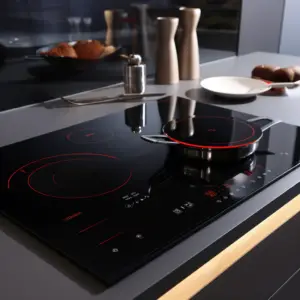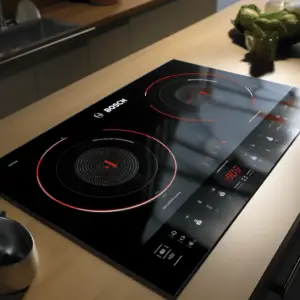Bosch Induction Cooktops, Induction cooktops or simply hobs are the latest craze in the cooking arena. These induction cooktops are the pinnacle of technology and for many people, they represent a key ingredient in the style and aesthetic of their kitchens.
The sleek modern facade coupled with the minimalist architecture fits perfectly with the dominant culture today which is the contemporary look.
Induction cooktops are also a marvel from a technological standpoint. Unlike its predecessors, the electric cookers and gas, induction cooking uses a magnetic charge or magnetic induction to heat cooking pans directly. It is also an electric cooker though hardly anyone refers to it this way.
A gas cooker, for instance, relies on thermal conduction to channel heat to the cooking pans and to their contents. Magnetic induction is faster, cleaner, has almost no wasted energy, and is easy to use. Heat transfer to the pot is instantaneous with magnetic induction making it a huge boon in the quest to save power.
This technology is not new but it is certainly new in the kitchen. Expectedly, there are some problems that arise when using a Bosch induction hob but if you must have one then Bosch is one of the best companies in this field.
Table of Contents
Bosch induction cooktop problems

Some of the common challenges you will experience with your induction cooktop are:
- The cooktop is not working even when switched on
- The cooktop switches itself off
- Crackling or humming sound when cooking
- A blinking symbol that won’t stop (Usually the letter F)
The cooktop is not working even when switched on
This is the most common problem with the Bosch induction cooktop. It arises from the power connection at the power junction that feeds your cooktop.
Every model of Bosch induction cooktops has a manual that lists a very specific connection procedure for the induction cooker. You do not just plug it into a socket and start using it.
These instructions seem easy to execute but many consumers seem to always install the power junction wrong leading to this error.
Try redoing the entire process again following the instructions in the users’ manual. Be keen so that you may discern where you may have gone wrong.
If you do not succeed then you may call Bosch Customer Care and they will patiently guide you through the installation of the power junction.
You can also ask for help with the installation of the cooktop at the store when you bought the induction cooktop and this may be the best solution to prevent this problem from arising.
The cooktop switches itself off in the middle of cooking
This may not be a problem per se but an inconvenience. The longer you cook, the more the cookware gets hot and the induction plate is made to sense an excess of this heat and temporarily break the connection.
This is a safety measure built into the device to prevent it from overheating and damaging the induction coils.
This does not mean that it is a common occurrence since most if not all cooking is long finished before high enough temperatures to damage the induction coils can be reached.
More than likely, when this happens, you have overcooked the food already and it may be close to burning.
If your induction cooktop goes off while you have not finished cooking, then let the cooktop cool off and then turn itself back on.
The problem would be if it does not turn itself back on yet you have not turned or switched it off.
If this happens then you have to reset the machine and reboot it.
Remove all the pans from the cooktop and switch off the cooktop at the power source. Thirty seconds to a full minute should do the trick. Switch it on again and this should perform a hard reset.
The hob should work normally. If it still won’t restart after a hard reset, call Bosch Customer Care for help.
Crackling or humming sounds when cooking
Induction cooktops are a breeze to cook with given the almost inaudible sound they produce if any. If your induction cooktop is making a noise you have not heard before you should check for the following:
Crackling: Usually this may indicate that the cookware you are using is made oF two different materials and heat is causing them to vibrate against each other causing this sound.
To stop this, only use cookware that is compatible with the induction cooktop. Incompatible cookware may also damage the surface of the cooktop which will cause it to stop working altogether.
Humming sound: A continuous humming sound means that the cooker is still on and you have yet to completely shut it down and lock it. Never leave your induction cooktop unlocked especially where children are present.
Since there is no obvious indicator of fire, such as a flame, you may burn yourself or cause injury to others if they touch the cooktop assuming it to be off. The humming sound however should be sufficient warning to turn it off and lock it.
A blinking symbol that won’t stop (Usually the letter F)

A continuously blinking F symbol on your Bosch hob indicates that the cookware you are using is not compatible with your Bosch induction cooktop. If you do not rectify this and switch to crockery that is compatible, the cooktop will simply switch itself off.
There is a specific type of crockery designed for use with induction cookware and using different cookware may damage your cooktop induction coils which are the most important part of the cooktop anyway.
The added cost is of buying compatible pots and pans is unfortunate but absolutely necessary.
Fortunately, there is an array of cookware out there today that is compatible with induction cookware and fairly inexpensive though all of them cost a little more than the rest of the cookware that you have.
Since you have already invested in a Bosch induction cooktop which is not cheap, it would be prudent to do the same and invest in a decent set of pots and pans to go with it.
